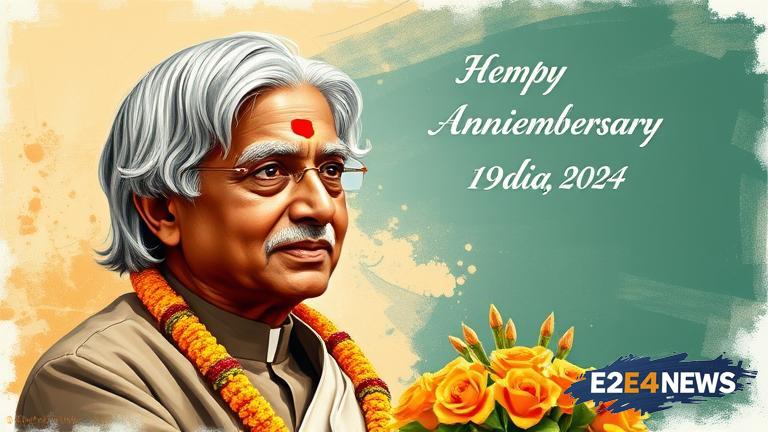Today, India observes the death anniversary of its former President, APJ Abdul Kalam, who passed away on July 27, 2015. Prime Minister Narendra Modi led the tributes, remembering Kalam as a great personality who dedicated his life to the nation. Kalam, also known as the ‘Missile Man of India’, was a renowned scientist and engineer who played a crucial role in the development of India’s missile program. He was born on October 15, 1931, in Rameswaram, Tamil Nadu, and rose to become one of the most respected and beloved leaders of the country. Kalam’s contributions to India’s space and defense programs are still celebrated and recognized today. He was a strong advocate for education and innovation, and his vision for a developed India continues to inspire generations. As a scientist, Kalam worked with the Indian Space Research Organisation (ISRO) and the Defence Research and Development Organisation (DRDO), where he developed several missiles, including the Agni and Prithvi. His work in the field of space research and missile development earned him numerous awards and accolades, including the Padma Bhushan, Padma Vibhushan, and Bharat Ratna. Kalam’s presidency, from 2002 to 2007, was marked by his efforts to promote education, science, and technology. He was a strong supporter of the National Knowledge Commission and the National Innovation Council, which aimed to promote innovation and entrepreneurship in the country. Kalam’s love for teaching and mentoring is still remembered by his students and colleagues, who recall his simplicity, humility, and kindness. He was a prolific writer and authored several books, including ‘Ignited Minds’ and ‘The Luminous Spark’, which continue to inspire and motivate readers. Kalam’s death anniversary is an opportunity for Indians to reflect on his legacy and contributions to the nation. His vision for a developed and prosperous India continues to guide the country’s development trajectory. The government has launched several initiatives and programs to promote innovation, entrepreneurship, and education, which are a testament to Kalam’s enduring legacy. As the country remembers Kalam, it is also an occasion to recognize the importance of science, technology, and innovation in driving India’s growth and development. Kalam’s life and work serve as a reminder of the power of dedication, hard work, and perseverance in achieving greatness. His contributions to India’s space and defense programs will always be remembered as a significant milestone in the country’s history. The outpouring of tributes and condolences from across the country is a reflection of the deep respect and admiration that Kalam commanded. His legacy continues to inspire Indians to strive for excellence and to work towards creating a better future for the country. Kalam’s death anniversary is a solemn occasion, but it is also an opportunity to celebrate his life and achievements, and to recommit to his vision for a developed and prosperous India. The country will always remember Kalam as a true son of India, who dedicated his life to the nation and inspired countless Indians to follow in his footsteps. As India continues to grow and develop, Kalam’s legacy will remain an important part of its history and heritage. His contributions to science, technology, and innovation will continue to inspire and motivate future generations of Indians. The government and people of India will always be grateful for Kalam’s service to the nation, and his memory will continue to be celebrated and honored for years to come.
